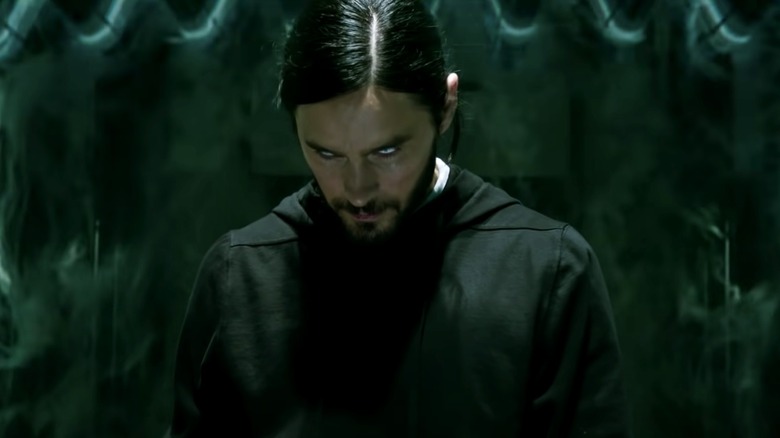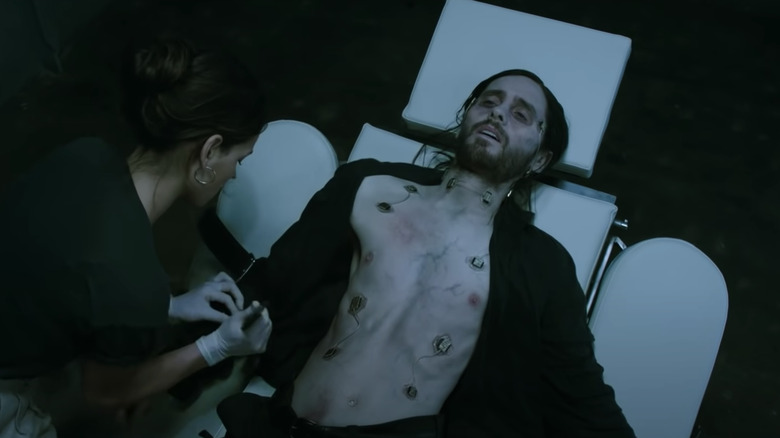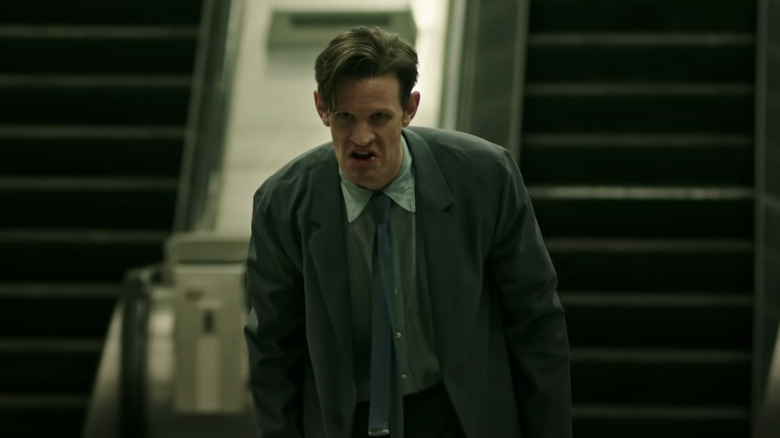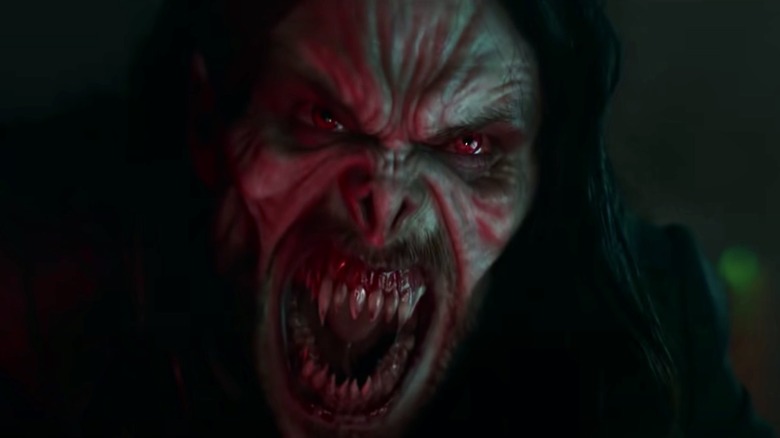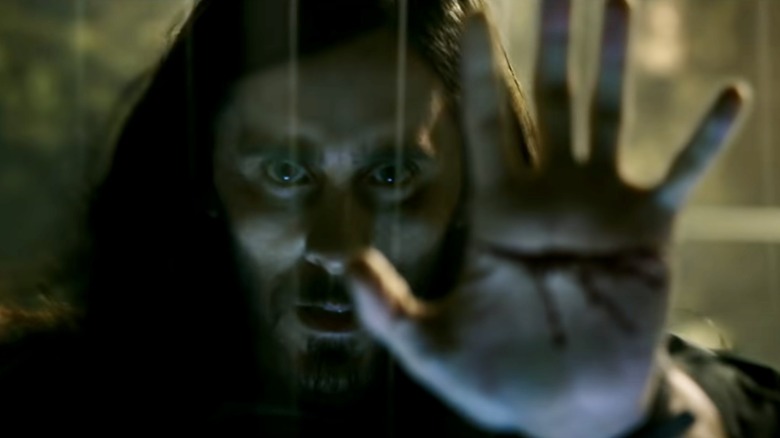Morbius Spoiler Review: Drinking A Bag Of Artificial Blood Is More Appealing Than This Sequel-Bait
In "Morbius," Sony's Spider-Man Universe (as it's now officially known) gets cluttered with mist trails and swarms of CG bats, and if you squint hard enough through the requisite darkness, you'll see a couple of vampires, played by Jared Leto and Matt Smith. Leto is one of those actors who has a bandwagon of online hate running alongside him at all times, and this often creeps into reviews of his films, if not outright shaping the entire tone of them. For the purposes of this spoiler review, I'm going to try and keep it firmly focused on what's onscreen in "Morbius," and let any other (blood) baggage fall by the wayside.
What's onscreen in "Morbius" is a superhero film based on a Marvel Comics character about a doctor who turns himself into a living vampire. Origin-wise, Dr. Michael Morbius is essentially Dr. Curt Connors, aka the Lizard — the villain played by Rhys Ifans in "The Amazing Spider-Man" and "Spider-Man: No Way Home" — but with bats substituted for lizards. Instead of trying to grow his arm back, he's trying to cure his blood disease.
At times, Morbius also feels like a bargain-basement Batman or Hulk. This is never more apparent than when he makes his vampire debut, picking off mercenaries from the shadows of a cargo ship that could just as easily be the Gotham docks in "Batman Begins" or the Rio factory in "The Incredible Hulk." He summons bats from caves and communes with them in chambers while generic, Hans Zimmer-esque music swells, and he hulks out and delivers lines like, "You wouldn't like me when I'm hungry," which wink directly at famous superhero quotes.
The aspirational vampire
Though Morbius is a snarling monster, screenwriters Matt Sazama and Burk Sharpless and director Daniel Espinosa try to imbue him with aspirational qualities. In his human form, we're told that he's "saved more lives than penicillin" by developing synthetic blood. Naturally, he rejects the Nobel Prize, has a good bedside manner with sick kids, and is fluent in foreign languages. Both he and Smith's character, Milo, undergo miraculous, hero-of-the-beach transformations that leave them each with the "constitution of an Olympic athlete," prone to admiring their newfound muscles in the mirror, just like Tobey Maguire in the first "Spider-Man" movie.
These kinds of hyperbolic traits verge on overkill. Speaking of kills, there are plenty of those on both sides in "Morbius." No sooner does Morbius experience his first metamorphosis than he's tearing through those poor mercenaries, leaving eight of them dead in international waters. There's no real transformation scene; his girlfriend and fellow scientist, Martine (Adria Arjona), just steps away from the observation window, and then comes back to find Morbius on the ceiling already, thirsty for blood.
It's a bit jarring to see him flip on a dime like this and immediately begin killing guys. It's okay, though, because the movie takes great pains to remind us that they're unlikeable brutes, just "thugs, hired guns," as the wealthy Milo puts it.
Incidentally, Milo isn't his real name. It's one he inherited from the last kid who held his bunk in the hospital in Greece where Michael and Milo first became childhood friends. He says his name is Lucien, but Michael immediately takes to calling him Milo, and so does their surrogate father, Emil (Jared Harris, mostly wasted insofar as his character only exists to die and provide a perfunctory "All Is Lost" moment before the third act).
Michael and Milo
Milo's name gets repeated so many times in "Morbius," despite the fact that it's not his real name, that it's as if the filmmakers are baiting the viewer into inventing a Milo Morbius drinking game. In a way, this is refreshing, since in most other respects, "Morbius" is the sort of flick where you'd be hard-pressed to remember any of the character's names. I'm not sure what the purpose of Tyrese Gibson's character, Simon Stroud, is, except to point a gun and say, "Enough!" — and perhaps set up a future reappearance.
The main through-line in "Morbius" is the friends-turned-enemies relationship between Michael and Milo, who feed their vampire urges in different ways. Morbius doesn't spend too much time grappling with the horror of what he did on that cargo ship, because he's too busy testing out his cool new powers, which include echolocation ("bat radar for the uninitiated," he explains). He does, however, recognize that he's "done things, killed people," so he vows, "What happened on that ship can never happen again." This leaves him staggering into freezers, sucking down blood bags like Capri Sun juice pouches. It's better than drinking nurses!
Vampirism is a curse for Morbius, but for Milo, it's a chance to turn the tables on the world that bullied him when he was younger. He embraces being a vampire, which is more than you can say for the CGI. The most disappointing thing about "Morbius" from a visual standpoint is that it only half-commits to the title character's vampire appearance. Most of the time, it just seems content to throw a hoodie on Leto and have him walk around like a white-eyed version of his character in "The Little Things." Morbius continually wobbles between human and vampire and it feels like we never get a good look at him outside the money shots that we already saw in trailers, some of which came out over two years ago.
Should have gone full Dracula
Morbius assures his love interest, who finds vampires romantic, "I wasn't going to go full Dracula on you." This is one of many lines that land like the doctor is self-diagnosing the flaws of his own film. Others come when Morbius says there's "something missing from our DNA," or when he says he "doesn't have very good sea legs," or when someone utters the phrase "bag of artificial blood," or when someone else insinuates, "You need a [script] doctor?"
Milo's CG vampire face looks especially bad, and it doesn't help when they have him running in slow-mo. Due to their condition, Morbius and Milo both start out looking sunken-eyed and cadaverous, rather like vampires, even before they've turned. As a boy, Milo almost drops dead in his very first scene, so as an adult, he really enjoys being a late bloomer, chewing on toothpicks, wearing pin-striped suits, and showing off his dance moves, all the things you'd expect from a vampire who has a lust for life.
Morbius also has fun following the trail of counterfeiters and commandeering their headquarters. "Did you know there are 27 bones in the human hand?" He will break some of them to get what he wants.
Milo comes to visit him in prison, then gives himself away as a vampire by walking off without his cane, and this is all Morbius needs to bounce back from his "Did I do that?" moment with the dead nurse and become a full-fledged superhero. Yet the character begins as a boy who needs constant blood transfusions and the fact that he builds up a tolerance to blood also might function as commentary on the all-consuming nature of superhero fandom.
Milo's inevitable death as a Marvel movie villain engenders no more tears than the eight expendable mercenaries. And if you've seen the trailers for "Morbius" and/or read that one spoiler-filled, pre-release Twitter Q and A with Espinosa, that's really all there is to see here, folks. The movie doesn't have a whole lot else to offer. Maybe Sony already knew that it had a dud on its hands and that's why they didn't use the extra two years to fix the issues plaguing this anemic superhero vampire film.
Taking the superhero blood bait
Comic book movies have trained us to sit through the credits and be on the lookout for Easter eggs. Until the end, "Morbius" is mostly well-behaved regarding the latter. Yes, there's that "I am Venom" line, but the other reference to "Venom" — an allusion to "that thing in San Francisco" — lands a bit subtler, like the Blüdhaven line in "The Batman" or the Metropolis line in "Batman Forever." There's also a Daily Bugle headline, but that's less blatant than, say, a J. Jonah Jameson cameo.
Then the cliffhanger happens, with Martine, who Morbius has bitten, waking back up with red vampire eyes. And then there are the disjointed credits scenes, with Michael Keaton's Vulture suddenly being shoehorned in and given a two-scene arc from multiverse exile to super-team recruiter. It leaves a sour taste in one's mouth, though it's obviously meant to inspire a thirst for more superhero blood. Like the bats of Cerro de la Muerte, the "mountain of death" in Costa Rica seen at the beginning of "Morbius," we do tend to take the blood bait for movies like this.
When Emil talks about sending young Morbius to a "school for gifted children in New York," I half-expected him to go off and become an X-Man. When a prison guard tells Morbius, "Your lawyer's here," I half-expected to see Matt Murdock show up. Not because those things would make any narrative sense, just because they would be par for the course in the shared multiverse of every Marvel movie ever made, which is where we seem to be heading.
I almost wish they would fold Morbius into the mainline Marvel Cinematic Universe just so we could see Mahershala Ali's Blade slay him in an upcoming movie. Sunlight isn't fatal to Morbius, which frees him up to inhabit a world where every superhero (and, now, antihero/supervillain) under the sun seems destined to get their own solo film.
Did we need this movie? No. Is it good? Not particularly. But hey, we can always look forward to the sequel!
